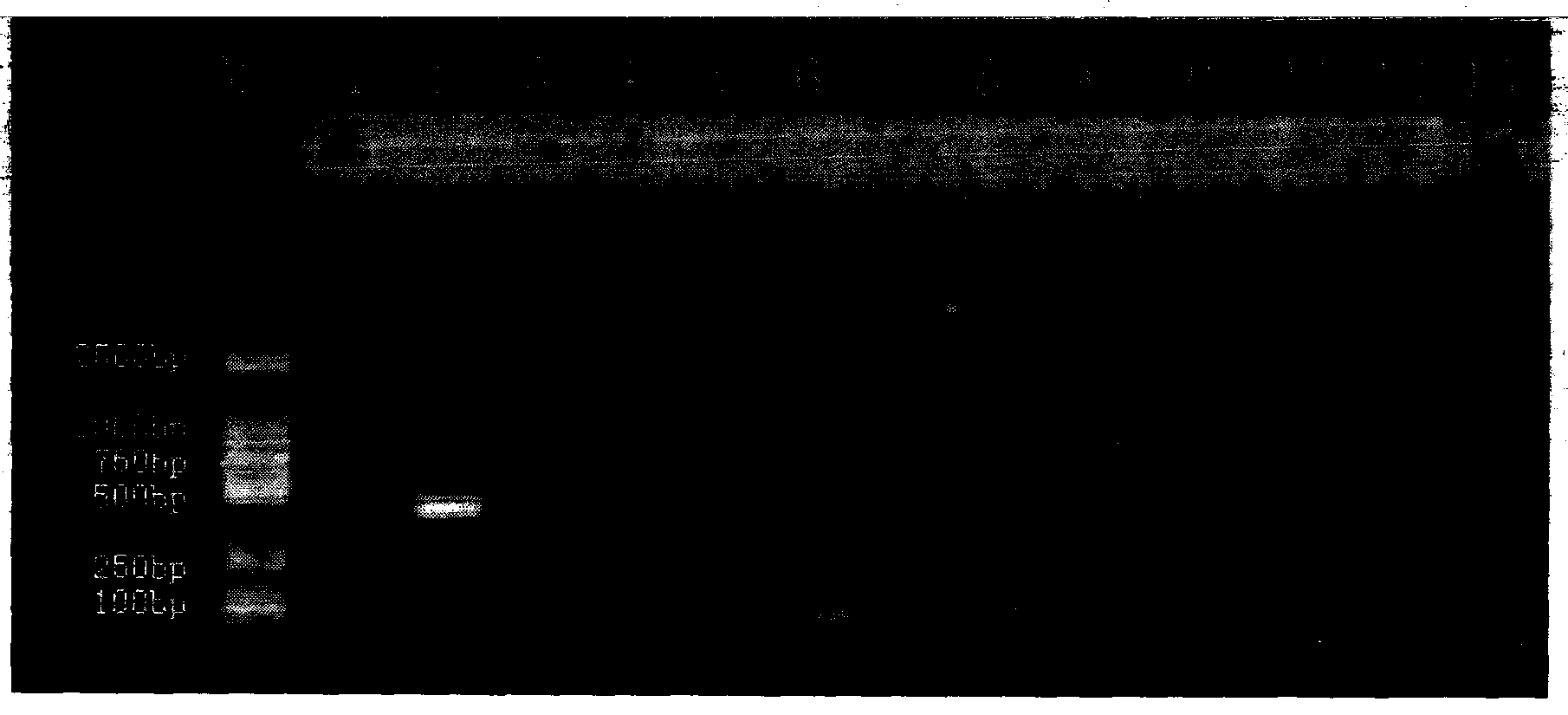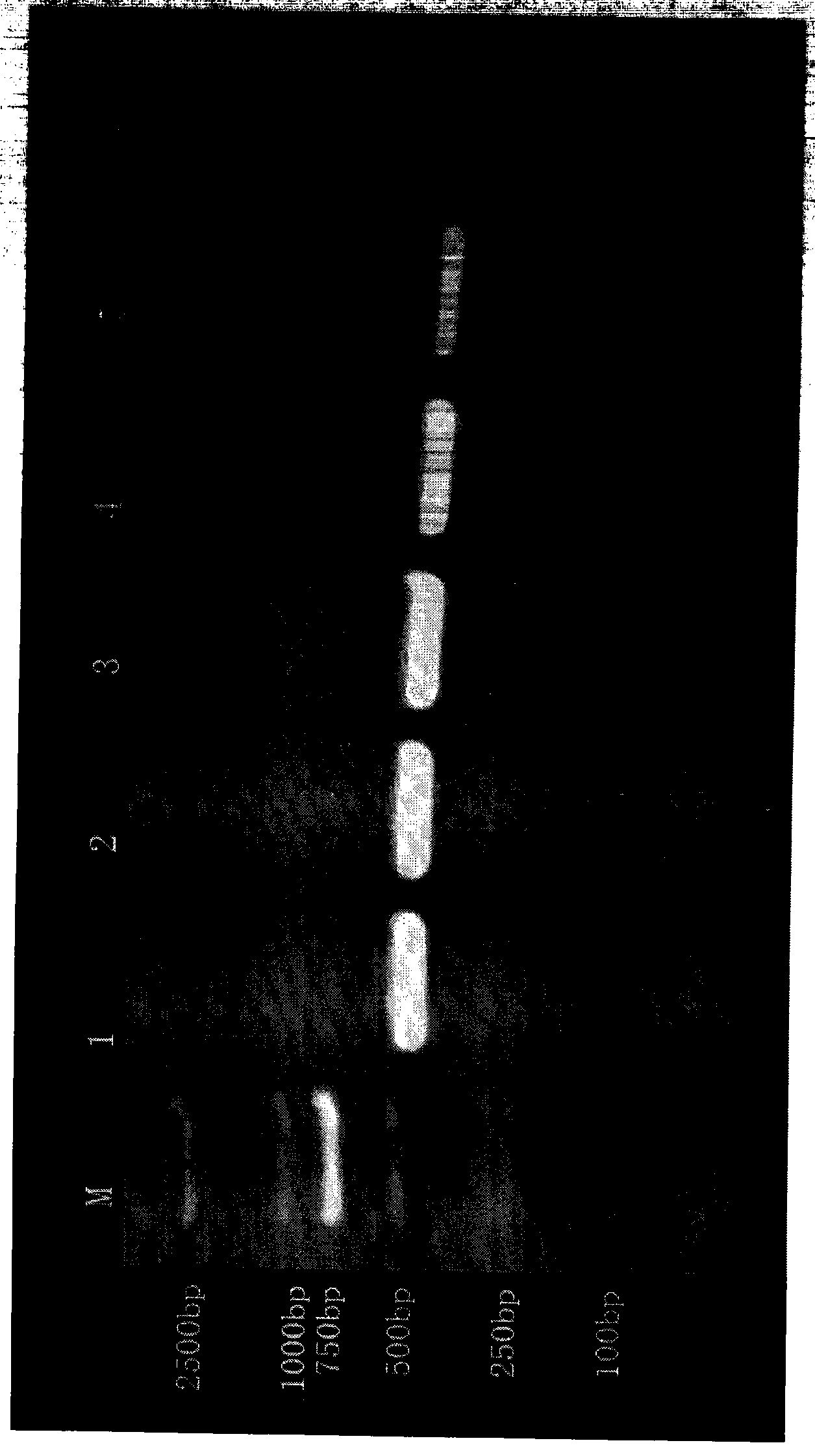PCR (polymerase chain reaction) detection method for specificity of salmonella typhimurium
A Salmonella and detection method technology, applied in the field of safety inspection of poultry and its products, can solve the problems such as nucleic acid and primers, multiple PCR cost, high experimental technology, false positive PCR results, etc. that have not been invented for Salmonella typhimurium PCR detection method, and achieve detection The effect of short time, simple result judgment, and specific test results
- Summary
- Abstract
- Description
- Claims
- Application Information
AI Technical Summary
Problems solved by technology
Method used
Image
Examples
Embodiment 1
[0014] Example 1 Establishment of a specific PCR detection method for Salmonella typhimurium
[0015] Step 1: Design a primer pair that specifically amplifies Salmonella typhimurium
[0016] Through bioinformatics analysis, the conserved and specific STM4493 gene was screened from the genomic DNA sequence of Salmonella typhimurium, and it was used as the target gene for detecting Salmonella typhimurium. The gene sequence is shown in SEQ ID NO: 1;
[0017] Input the DNA sequence of the STM4493 gene into the software Primer Premier 5.0 to design the amplification primer pair, set the GC% range to 40% to 60%, and the product size range to 100 to 500bp, and select the primer pair from the alternative primer pairs. The primer pair sequence is as follows (The primers were synthesized by Shanghai Jikang Biotechnology Co., Ltd.)
[0018] Upstream primer: 5-'AAATGTGCTTGAGGCGTTAG-3' (SEQ ID NO: 2);
[0019] Downstream primer: 5-' CGTGCGGCGATGTTAGTT-3' (SEQ ID NO: 3)
[0020] Step 2, ...
Embodiment 2
[0027] Example 2 Specificity evaluation experiment of Salmonella typhimurium PCR detection method
[0028] Step 1, DNA template preparation
[0029] Salmonella typhimurium (S.Typhimurium), Salmonella paratyphi A (S.Paratyphi A), Salmonella paratyphi B (S.Paratyphi B), Salmonella paratyphi C (S.Paratyphi) were extracted according to step 2 of Example 1. C), Salmonella Gallinarum (S.Choleraesuls), Salmonella Pullorosis (S.Pullorosis), Salmonella Duck (S.Anatis), Salmonella Gallinarum (S.Gallinarum), Salmonella Dublin (S.Dublin), Salmonella Enteritidis (S. Enteritidis), S. Heidelberg (S. Heidelberg), S. Senftenberg (S. Senftenberg) genomic DNA template.
[0030] Step 2, specificity evaluation test of Salmonella typhimurium PCR detection method
[0031] According to the PCR reaction system in step 3 of Example 1, take 1 μL of the DNA template of each strain prepared in step 1 as the PCR reaction template and add it to the PCR reaction system respectively, and use 1 μL of sterile...
Embodiment 3
[0039] Example 3 Sensitivity evaluation experiment of Salmonella typhimurium PCR detection method
[0040] Step 1, DNA template preparation
[0041] According to step 2 of Example 1, the DNA genome templates of Salmonella typhimurium were extracted respectively, and the concentration of Salmonella typhimurium DNA solution was 24.85 μg / ml by OD260 / 280 detection, and 10-fold gradient dilution was made with sterile water, and a total of 6 gradients were diluted.
[0042] Step 2: Sensitivity evaluation test of Salmonella typhimurium PCR detection method
[0043] Take 2 μL of each gradient and add it to the PCR reaction system, and perform PCR amplification detection on the DNA template according to the method in step 3 of Example 1.
[0044] Step three, result judgment
[0045] Take 5 μL of PCR amplification product, conduct electrophoresis analysis on 2% agarose gel, and observe under ultraviolet light irradiation. If the electrophoresis result shows a single amplification ban...
PUM
 Login to View More
Login to View More Abstract
Description
Claims
Application Information
 Login to View More
Login to View More - R&D
- Intellectual Property
- Life Sciences
- Materials
- Tech Scout
- Unparalleled Data Quality
- Higher Quality Content
- 60% Fewer Hallucinations
Browse by: Latest US Patents, China's latest patents, Technical Efficacy Thesaurus, Application Domain, Technology Topic, Popular Technical Reports.
© 2025 PatSnap. All rights reserved.Legal|Privacy policy|Modern Slavery Act Transparency Statement|Sitemap|About US| Contact US: help@patsnap.com



